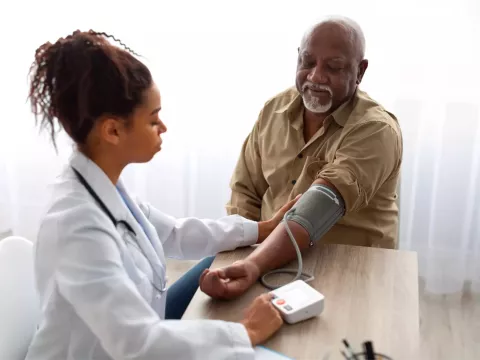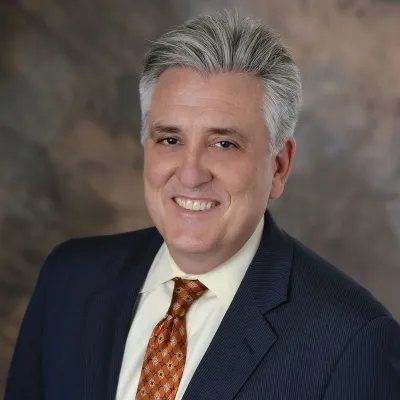- AdventHealth Cardiology Team

Choose the health content that’s right for you, and get it delivered right in your inbox.
Cardiac arrest is often assumed to be the same thing as a heart attack, but the two have key differences. Being able to identify cardiac arrest risk factors and early signs in yourself and your loved ones could help you save a life.
What is Cardiac Arrest?
One of the leading causes of death in the United States, cardiac arrest can happen at any age and can affect any person.
Cardiac arrest occurs when the heart malfunctions and stops beating unexpectedly. An electrical failure in the heart triggers it and causes an irregular heartbeat or arrhythmia. A person suffering from cardiac arrest may become unresponsive, unable to breathe or gasping for air. Symptoms include:
- Suddenly collapsing
- Loss of consciousness
- No breath
- No pulse
Celebrities who did not survive sudden cardiac arrest include musician Tom Petty, who died unexpectedly in 2017 at age 66; actor John Ritter, who was 54 when he suffered an aortic dissection that led to cardiac arrest in 2003; and child actress Heather O’Rourke, who was only 12 years old when her life was cut short by cardiac arrest in 1988.
What makes sudden cardiac arrest so dangerous is the sudden and drastic nature of its effects. With only about an 8% survival rate for out-of-hospital cardiac arrest when treated by emergency services, quick medical attention is required to survive.
What is a Heart Attack?
On the other hand, a heart attack, also known as a myocardial infarction, occurs when fatty, cholesterol-containing deposits build up in your arteries and create what we call “plaque.”
Symptoms of a heart attack include:
- Fatigue
- Lightheadedness or dizziness
- Pain or discomfort in one or both arms, neck, jaw or stomach
- Nausea/vomiting
- Shortness of breath
- Sweating/cold sweats
- Tightness, squeezing, pain or pressure in the chest/upper body (this feeling may go away and then come back)
- Trouble Sleeping
These symptoms are often subtle and may go undetected as they creep up slowly, sometimes lasting for days or weeks before the attack. Many people brush off symptoms like the flu, stress, or simply feeling under the weather. Always seek help to be sure.
Causes of Heart Attack
Coronary artery disease is the primary cause of heart attacks. The plaque buildup narrows the walls of your arteries, reducing blood flow to your heart. And if this plaque breaks or ruptures, it can cause a blood clot in your heart.
A larger amount of plaque buildup in your arteries puts you at a higher risk for a heart attack, though many people do experience heart attacks with only partially blocked arteries.
Though the main cause of heart attacks, coronary artery disease is not the only cause. You may also experience a heart attack from the following:
- Coronary artery spasm — Known as angina, this severe squeezing of a blood vessel that isn’t blocked is often caused by smoking, high blood pressure and other factors.
- Infections — Certain viral infections may cause damage to the heart muscle that can lead to an eventual heart attack.
- Spontaneous coronary artery dissection (SCAD) — This is a life-threatening condition in which there is a tear in one of your cardiac arteries.
Cardiac Arrest vs. Heart Attack
Though often confused, cardiac arrest and heart attack are distinct medical emergencies that require immediate action.
Cardiac Arrest: Sudden and Severe
Cardiac arrest occurs when the heart suddenly stops beating, leading to loss of consciousness and no pulse. It affects about 1,000 Americans each day, and survival with good brain function is just 8%. The most important factor in survival is early defibrillation, which can be provided by EMS or a bystander using an AED. Quick CPR and AED use can be lifesaving.
Heart Attack: A Circulation Crisis
A heart attack — commonly called a myocardial infarction — happens when blood flow to the heart muscle is blocked, often due to a clot. This leads to heart muscle damage and can trigger cardiac arrest if untreated.
Preventing heart attacks involves managing blood pressure, cholesterol, blood sugar, and avoiding smoking. Those with heart disease may need further evaluation through imaging or stress testing, along with ongoing lifestyle changes like regular activity and a heart-healthy, plant-forward diet.
What to Do
If you suspect someone is having a heart attack or cardiac arrest, call 911 immediately. Prompt action and prevention are both vital in protecting heart health.
Risk Factors
Cardiac arrest is more common in adults, often linked to heart disease, high blood pressure, diabetes, smoking, and other lifestyle factors. Regular checkups and heart-healthy habits are important for prevention.
In younger people, cardiac arrest is rarer but can happen due to undiagnosed conditions like:
• Congenital heart defects that affect blood flow
• Inherited arrhythmias (electrical issues in the heart)
• Cardiomyopathy, where the heart muscle is abnormally thick or weak
Many of these conditions have no warning signs, so family history and screenings can play a lifesaving role.
Don’t Hesitate to Seek Help
Most cardiac arrests occur at home. Performing CPR or even just compressions to the chest can improve the chances of survival until emergency medical teams arrive.
If you suspect you or a loved one is having a heart attack or cardiac arrest, call 911. It’s better to call for emergency help than to risk underestimating your symptoms.
Medically Reviewed By

Dr. Jeffrey Kuhlman
Dr. Jeffrey Kuhlman is Senior Vice President and Chief Quality and Safety Officer for AdventHealth. Before joining AdventHealth, he served for 30 years as a Navy Physician, spending 16 years with the President and the White House as Physician to the President, Director of the White House Medical Unit, White House Physician and Senior Flight Surgeon for Marine One. Dr. Kuhlman is triple board-certified in aerospace, family and occupational Medicine. He is board-certified in medical management, was awarded a certificate in traveler’s health and holds credentials as a Certified Professional in Patient Safety and a Certified Physician Executive.
Learn more about Dr. Kuhlman’s extensive experience and contributions on AdventHealth Press, AdventHealth Research Institute, AHU Board of Trustees, and his Wikipedia profile.
About the Author
AdventHealth Cardiology Team
The AdventHealth Cardiology Team is dedicated to providing exceptional care for heart health, offering advanced diagnostic services, personalized treatments, and innovative procedures. We are committed to helping you achieve a healthy heart for life.
The in-house editorial team at AdventHealth produces evidence-based, accurate, and accessible content, leveraging expert input from clinicians and subject matter experts.



